2024 a year of Depression, No 2024 election , truth is bad, petro dollar wars, migrants free food
To Watch full video go Here - https://rumble.com/v444v56-mike-in-the-night-e540-happy-new-year-next-weeks-news-today-headlines-call-.html
Originally Aired on Dec 30, 2023, 10:00 pm EST
Buy Mike A Coffee - https://donorbox.org/buy-me-a-coffee-53
Link to the Most Powerful Glutathione in the World - https://mikeinthenight.neumi.com/home
#mikeinthenight #mikemartins
"Economic depression" and "economic recession" are terms used to describe downturns in the business cycle, but they differ in terms of severity, duration, and the impact on various economic indicators. While there isn't a universally agreed-upon definition for each term, they generally convey the following meanings:
Economic Recession:
Definition: A recession is a significant decline in economic activity across the economy that lasts for an extended period, typically measured in terms of two consecutive quarters of negative GDP growth.
Duration: Recessions are generally shorter in duration than depressions, lasting anywhere from several months to a few years.
Impact: During a recession, there is a decline in consumer spending, business investment, and employment. The overall economic output, measured by Gross Domestic Product (GDP), contracts.
Economic Depression:
Definition: An economic depression is a severe and prolonged downturn in economic activity, characterized by a more prolonged and deep contraction compared to a recession. There is no strict definition, but it often involves a decline in GDP exceeding 10% and lasting several years.
Duration: Depressions are more extended and more severe than recessions, often lasting several years. They can lead to fundamental changes in the economy.
Impact: In a depression, the impact is more severe than in a recession. Unemployment rates can skyrocket, businesses may fail at a higher rate, and there is a prolonged and widespread decrease in economic activity.
It's important to note that the terms "recession" and "depression" are often used informally, and their definitions can vary among economists and policymakers. Economic conditions are complex, and the causes and consequences of recessions and depressions can be influenced by various factors, including monetary policy, fiscal policy, global economic trends, and financial market conditions.
Governments and central banks often implement policies to counteract the negative effects of recessions or depressions, such as fiscal stimulus packages or monetary policy adjustments, to encourage economic recovery.
economic recession, economic depression, business cycle, GDP, economic indicators, downturn, recovery, fiscal policy, monetary policy, unemployment, consumer spending, business investment, economic activity, financial market, global economy, economic downturn, economic growth, economic recovery, economic contraction, fiscal stimulus, economic policy, economic analysis, economic trends, macroeconomics, microeconomics, government intervention, central banks, economic impact, financial crisis, economic stability, economic factors
-
 10:20
10:20
Beyond The Told
2 months agoThe Looming Economic Shifts of 2024
19 -
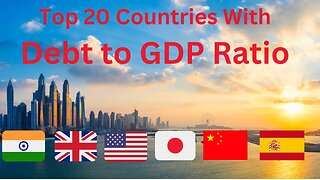 8:03
8:03
Meta Stats
3 months agoShocking Truth: TOP 20 Countries Drowning in Debt!
2 -
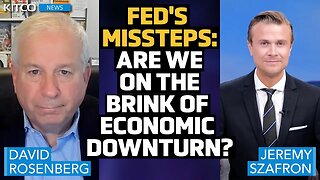 24:27
24:27
Kitco NEWS
1 month agoFed's Economic Missteps: Is America on the Verge of Crisis? - David Rosenberg
419 -
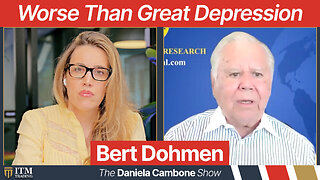 32:22
32:22
ITM Trading
24 days ago $0.82 earnedThe Fed is Lying; We’re Headed for Times Worse Than Great Depression Warns Insider Bert Dohmen
6265 -
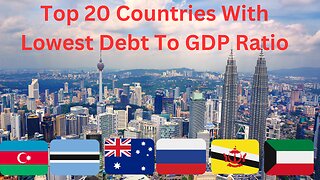 8:32
8:32
Meta Stats
2 months agoCountries That Are Financially Unbreakable in 2024! #DebtFree"
51 -
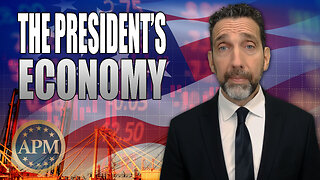 4:55
4:55
Augusta Precious Metals
4 months agoHas the President Ruined Our Economy?
2 -
![[With Subtitles] Credit Crisis Hits Worst Level Since Great Recession As Millions Of Americans Go Bankrupt](https://hugh.cdn.rumble.cloud/s/s8/1/S/S/n/G/SSnGr.0kob-small-Credit-Crisis-Hits-Worst-Le.jpg) 13:22
13:22
RAVries
19 days ago[With Subtitles] Credit Crisis Hits Worst Level Since Great Recession As Millions Of Americans Go Bankrupt
7026 -
 9:30
9:30
UpNorthMedia
4 months agoWhy Ray Dalio Is VERY Pessimistic About Global Economy In 2024
50 -
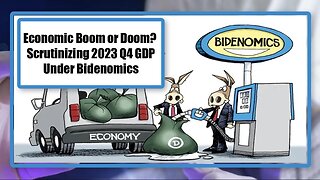 3:24
3:24
ChartGPT Today
4 months agoEconomic Boom or Doom? Scrutinizing Q4 2023 GDP Numbers Under Bidenomics
44 -
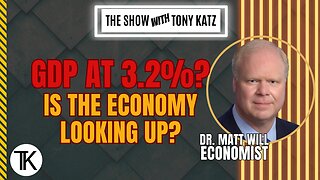 14:27
14:27
Tony Katz
4 months agoIs The Economy Getting Better Under Biden?
356